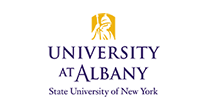News
April 18, 2019UAlbany Announces Formation of ‘The Graduate School’
Graduate education at the University at Albany now has a central home.
The University’s Office of Graduate Education, led by vice provost and dean Kevin Williams, has officially completed its conversion into “The Graduate School.”
According to Williams, the conversion will increase the profile and visibility of graduate programs at UAlbany. It also supports President Havidán Rodríguez’s new Strategic Plan – Authoring Our Success – by helping to address four of the University’s current goals:
- Increasing and maintaining robust graduate enrollments
- Promoting interdisciplinary research and education
- Increasing diversity in the graduate student body
- Ensuring student success and preparing students for different career pathways
“This change is going to have a tremendous impact on student recruitment,” said Williams, now dean of The Graduate School. “It adds legitimacy to our program offerings and puts us in line with most other Research I institutions. Renaming is a strategic approach that will help us attract and retain high quality, diverse students and faculty. It also provides a platform for stronger advocacy for graduate education and promotion of student success.”
The University’s current five-year enrollment plan calls for at least a nine percent increase in graduate enrollment by Fall 2023. As of Fall 2018, about 15 percent of graduate students at UAlbany identified an underrepresented minority, compared to about 40 percent for undergraduates.
Advantages of a Graduate School
UAlbany has traditionally operated under a hybrid model that included a mixture of centralized and decentralized administrative entities.
For example, the Office of Graduate Education has been responsible for administrative tasks such as processing graduate applications and program reviews while schools and colleges managed enrollment, program marketing and recruitment, and admission decisions.
By centralizing, The Graduate School will be able to communicate directly with prospective students/faculty and promote programs across all disciplines. Williams and his staff recently hired a full-time media and marketing specialist, implemented a customer management tool (CRM) to expedite the online application process and partnered with a data analyst to help with enrollment management.
UAlbany’s first round of Accelerator funding, announced to campus last December, includes $300,000 in presidential fellowship grants through 2021 to attract prospective doctoral students. Another $100,000 will help recruit top graduate students from underrepresented minorities and launch a visitation program to historically black colleges and universities and Hispanic-serving institutions.
Interdisciplinary Programs
Along with improving enrollment and retention, The Graduate School will offer incentives that could position interdisciplinary programs and partnerships to receive funding, according to Williams. A proposed interdisciplinary master’s program in cybersecurity, which will co-administered through the School of Business and College of Emergency Preparedness, Homeland Security and Cybersecurity, is already under review by the state’s Education Department.
In recent years, Williams and his staff have supported interdisciplinary research by funding for graduate research assistantships in The RNA Institute, Atmospheric Sciences Research Center (ASRC), and the Center for Elimination of Minority Health Disparities.
These new programs and partnerships will help expand offerings from the existing 150 graduate programs available at UAlbany across its nine schools and colleges, Williams said.
“The importance of interdisciplinary learning is readily acknowledged by most faculty and administrators on our campus, but traditional budgeting models provide limited incentives to encourage schools and colleges to work together,” Williams said. “The Graduate School will be in a position to serve as a neutral party and forge new relationships.”



























